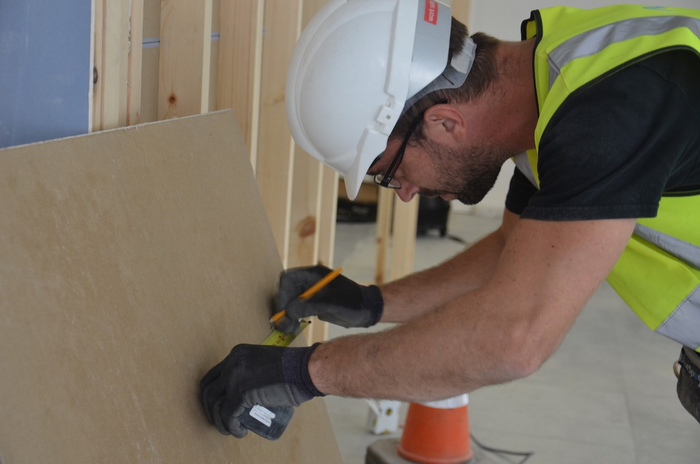Using bacteria to build eco-friendly construction materials
Researchers are investigating whether the natural properties of bacteria could help in developing a new type of biodegradable plasterboard.

[Sept 16, 2021: University of Bath]
Adaptavate is developing biodegradable plasterboard that is made using crop waste instead of gypsum. (Credit: Adaptavate)
They are working with start-up company Adaptavate, which makes sustainable building materials. Their biodegradable plasterboard, Breathaboard uses compostable crop waste instead of gypsum, is lighter and has better thermal and acoustic insulation compared with traditional plasterboard.
Microbiologists from the University of Bath’s Department of Biology & Biochemistry, and concrete experts from the Department of Architecture and Civil Engineering have been awarded funding by the National Biofilms Innovation Centre (NBIC), for a six-month pilot project that aims to optimise the properties of the prototype plasterboard using their bacteria-based construction technology (BBCT).
If successful, the plasterboard can be scaled up and developed further.
Dr Susanne Gebhard, Senior Lecturer in the University’s Department of Biology and Biochemistry and the Milner Centre for Evolution, is leading the project in collaboration with Professor Kevin Paine from the University’s Department of Architecture and Civil Engineering.
She said: “Biofilms are formed when bacteria stick together to coat a surface, as opposed to growing neat dot-shaped clumps on a petri dish.
Related Stories:
“This is a really exciting project that will see whether we can exploit the natural biofilm-forming abilities of bacteria to function as a kind of glue that will help improve the properties of biodegradable construction materials.”
Jeff Ive, Technical Director at Adaptavate, said: “Gypsum is the third most used construction material and accounts for 3% of UK carbon emissions.
“It’s either mined or produced from waste from coal power stations and is becoming increasingly expensive to produce. As it’s calcium sulphate based, it also needs to be disposed of carefully so it doesn’t harm the environment.
“Our Breathaboard is a low carbon sustainable alternative to gypsum based plasterboard and could make a real difference to the carbon emissions of the construction industry.
“We’re delighted to be working with the University of Bath to further develop this product.”
Note: Materials provided above by University of Bath. Content may be edited for style and length.
Like these kind of feel good stories? Get the Brighter Side of News' newsletter.
Tags: #New_Innovations, #Green_Good_News, #Eco_Friendly, #Building, #Agriculture, #Waste, #The_Brighter_Side_of_News
Joshua Shavit
Science & Technology Writer | AI and Robotics Reporter
Joshua Shavit is a Los Angeles-based science and technology writer with a passion for exploring the breakthroughs shaping the future. As a contributor to The Brighter Side of News, he focuses on positive and transformative advancements in AI, technology, physics, engineering, robotics and space science. Joshua is currently working towards a Bachelor of Science in Business Administration at the University of California, Berkeley. He combines his academic background with a talent for storytelling, making complex scientific discoveries engaging and accessible. His work highlights the innovators behind the ideas, bringing readers closer to the people driving progress.



